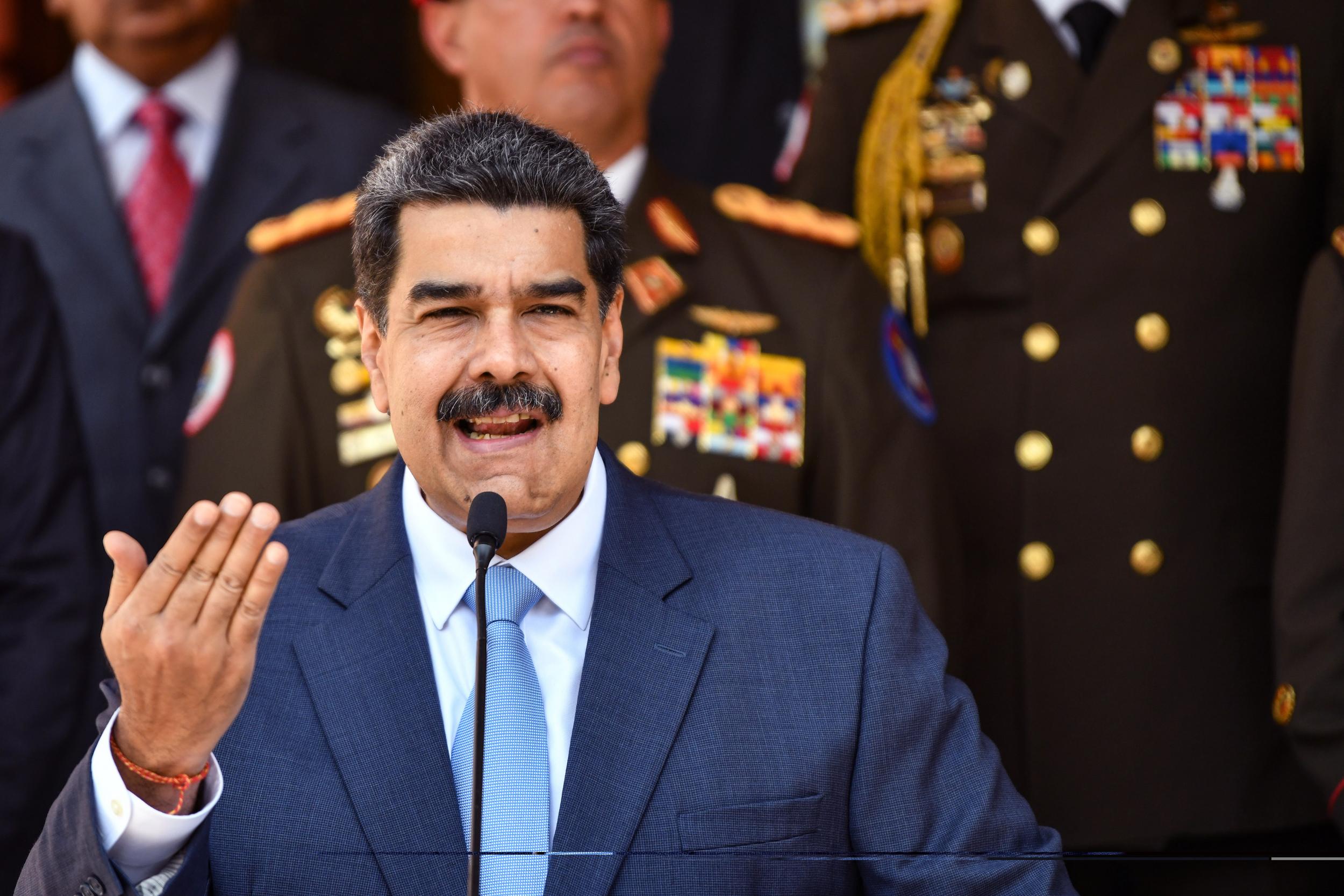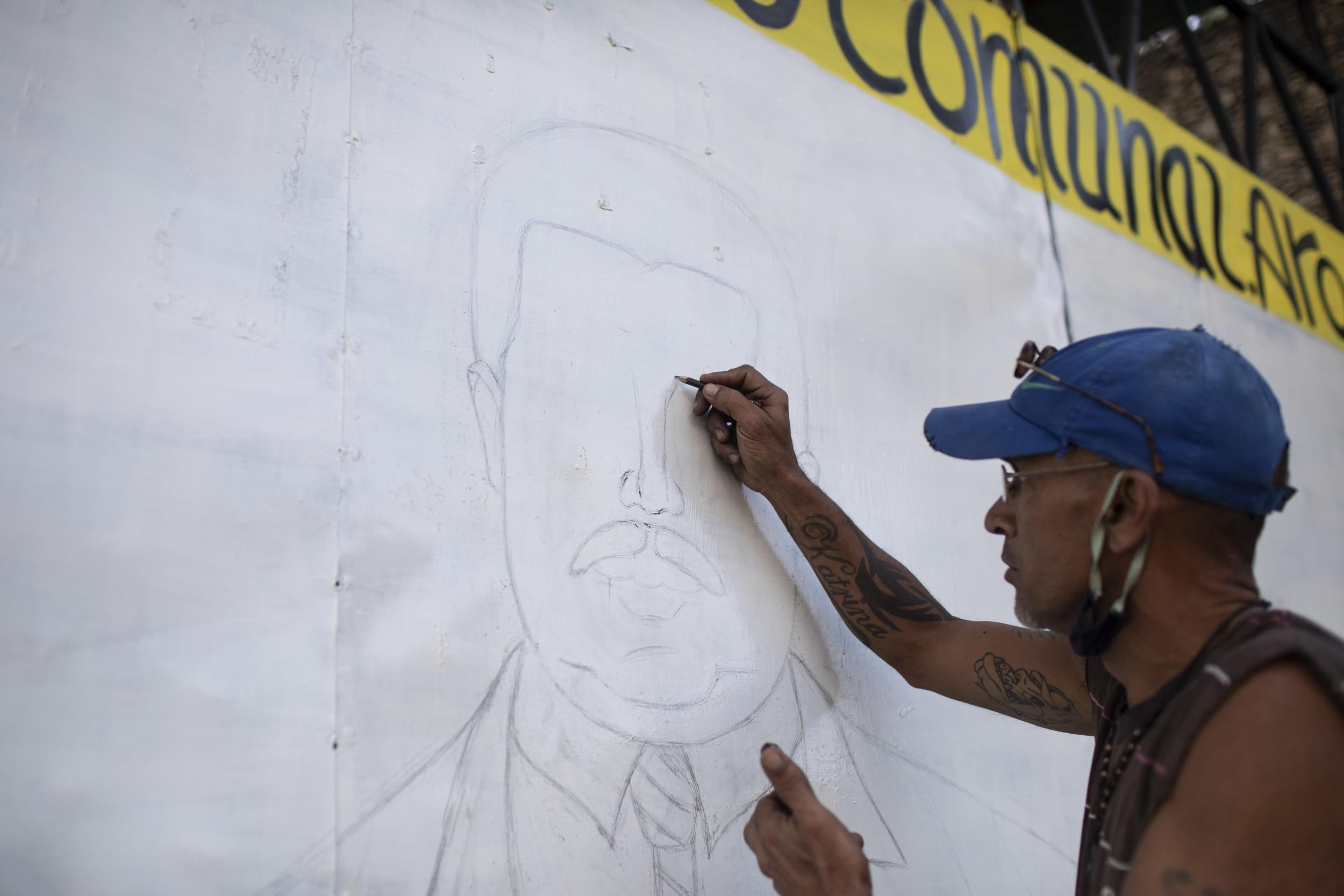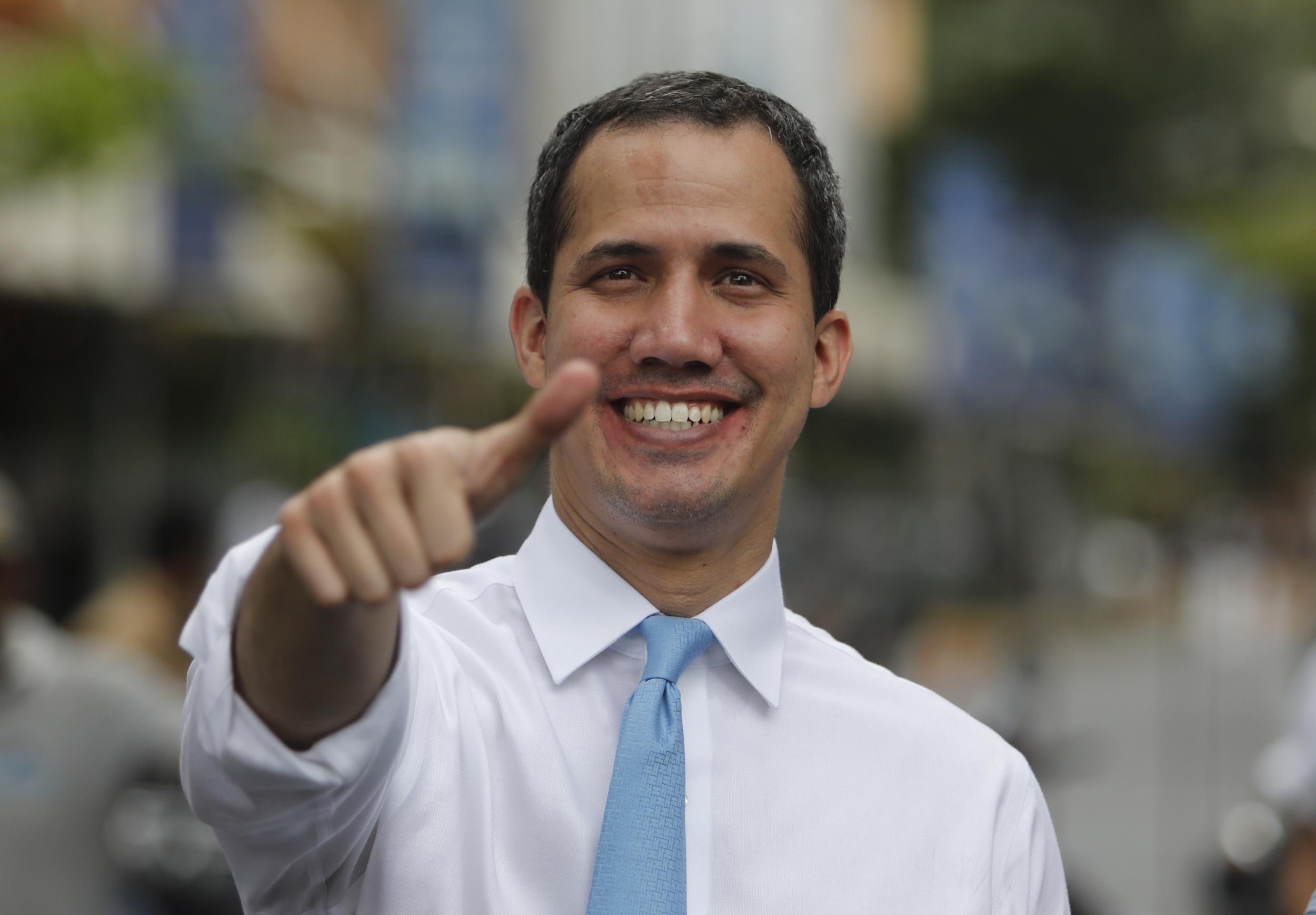Inside the operation to overthrew Maduro that Venezuela thwarted
Donald Trump and other US officials deny any knowledge of the operation
Your support helps us to tell the story
From reproductive rights to climate change to Big Tech, The Independent is on the ground when the story is developing. Whether it's investigating the financials of Elon Musk's pro-Trump PAC or producing our latest documentary, 'The A Word', which shines a light on the American women fighting for reproductive rights, we know how important it is to parse out the facts from the messaging.
At such a critical moment in US history, we need reporters on the ground. Your donation allows us to keep sending journalists to speak to both sides of the story.
The Independent is trusted by Americans across the entire political spectrum. And unlike many other quality news outlets, we choose not to lock Americans out of our reporting and analysis with paywalls. We believe quality journalism should be available to everyone, paid for by those who can afford it.
Your support makes all the difference.Inside a glittering Miami high-rise, representatives of the Venezuelan opposition sat in a room adorned with samurai swords and listened to a pitch. They had been appointed by opposition leader Juan Guaidó to explore all options in their US-backed quest to oust Venezuelan President Nicolás Maduro. On that afternoon on the shores of Biscayne Bay last September, a former US Army Green Beret presented them with an answer.
Jordan Goudreau, a Special Forces veteran who ran a strategic security firm on the Florida Space Coast, laid out a plan that could double as a screenplay for an episode of Jack Ryan. Goudreau claimed to have 800 men ready to penetrate Venezuela and “extract” Maduro and his henchmen, according to J J Rendón, the Venezuelan political strategist tapped by Guaidó to lead the secretive committee.
Guaidó “was saying all options were on the table, and under the table,” Rendón said. “We were fulfilling that purpose.”
By October, the plan had advanced to the point of a signed agreement, contingent on funding and other conditions. Rendón calls it a trial balloon, a test of what Goudreau could do that was never officially greenlit. But the language of the agreement left no ambiguity on the objective: “An operation to capture/detain/remove Nicolás Maduro ... remove the current Regime and install the recognised Venezuelan President Juan Guaidó.”
But soon after the signing, Rendón said, Goudreau began acting erratically. He failed to produce evidence of the financial backing he claimed to have lined up to fund the operation, Rendón said, and demanded immediate payment of a $1.5m (£1.2m) retainer. There was no evidence of 800 men. Rendón transferred him $50,000 (£40,400) for “expenses” to buy more time, but the relationship between the two men quickly went south.
“Washington is fully aware of your direct participation in the project and I don’t want them to lose faith,” Goudreau warned in a 10 October text message to Rendón.
There was an explosive argument in Rendón’s Miami condominium in early November, Rendón said. He and other opposition officials considered the operation dead.
First, Venezuelan officials said they had thwarted a predawn “invasion” aimed at killing Maduro. Then Goudreau appeared in a video with a former Venezuelan military officer in battle fatigues. The men proclaimed the start of an operation to “liberate Venezuela”. Goudreau said his operatives had entered Venezuela, but by then, the mission – apparently infiltrated by Maduro’s agents – had already sustained a devastating blow. Eight men have been killed and 13 others captured, two of them Goudreau’s fellow former Green Berets.
This report, based on interviews with more than 20 people familiar with the events, provides previously undisclosed details on the opposition’s discussions on what participants secretly dubbed “Plan C”: An armed incursion to locate and capture Maduro.
Donald Trump and other US officials have denied knowledge of the ill-fated operation. Secretary of State Mike Pompeo said Wednesday “there was no United States government direct involvement”.
Goudreau says he unsuccessfully sought US backing through an aide in the office of Vice President Mike Pence. He declined to name the aide. A spokeswoman for Pence said Wednesday there was “zero contact” between anyone in the vice president’s office and Goudreau.
“There was no coordination, nothing to do with this,” spokeswoman Katie Miller said.
Rendón said his committee kept details of its work to a small group, and never shared them with US officials because the plan was only being “studied”.
Goudreau insists some form of the operation is “ongoing” and that Venezuela’s mainstream opposition betrayed him by reneging on their deal. He said he opted to move forward with what he says he was hired to do. He said it had nothing to do with money; he was doing “the right thing”.
“This isn’t a wartime action, this is a policing action,” Goudreau said. “The world recognises one guy [Guaidó] as president, so they hired me to arrest to the other person who has usurped power, Nicolás Maduro.”
Goudreau, a Canadian-born American citizen, first walked through the looking glass of the anti-Maduro world last February, when he worked security at a Venezuelan aid concert on the Colombian border organised by British billionaire Richard Branson.
He served 15 years in the Army as an infantry mortarman and later as a Special Forces medical sergeant. He deployed to Iraq and Afghanistan twice each between 2006 and 2014, Army officials said.
“He had an intensity to him that was a little bit different,” said Joe Kent, a retired Green Beret who attended a leader’s course with him in 2007. “He seemed like he was training for something.”
In 2012, the Department of Defence launched a criminal investigation into Goudreau for alleged theft and fraud in connection with $62,000 (£50,099) in housing allowances he collected for his wife, court records show. Goudreau said the matter was resolved without any charges.

He founded SilverCorp USA in 2018. The firm advertises a variety of services, including assisting victims of kidnapping and extortion. According to a biography on the company’s website, Godreau planned and led “international security teams for the President of the United States as well as the Secretary of Defense.”
By last summer, Venezuela’s faltering opposition was looking for options. Guaidó had tried to lead a military uprising against Maduro on April 30, but the carefully constructed plot utterly collapsed as conspirators close to the autocrat either backed out or had been double agents the whole time. That left Guaidó, the National Assembly president who is recognised by the United States and more than 50 other nations as Venezuela’s rightful leader, fighting to regain momentum for his opposition movement.
One little known element of that fight was the creation last August of a new “Strategic Committee”. Its full membership remains secret, but its most public face is Juan José Rendón.
The 56-year old political strategist was perfectly suited to the task. Chased out of Venezuela by the ruling socialists in 2013 and threatened with torture should he return, he was no friend of Maduro. From his base in the intrigue-heavy world of Venezuelan exiles in Miami, he became an internationally sought political consultant.
His committee’s mission was to investigate scenarios for achieving regime change. Members researched pedestrian options, such as ratcheting up international pressure against the government.
But they also studied the possibility of effectively kidnapping Maduro and his close associates.
The effort involved speaking to more than a dozen attorneys about the legalities of such a mission, Rendón said. They looked at the “universal enemy” argument – once used to prosecute pirates – that formed the basis of some Nazi renditions after World War II. They compiled a dossier on the failed Bay of Pigs attempt to liberate Cuba from the government of Fidel Castro.
Questions of legality dogged the prospects of such an operation in Venezuela. But committee members ultimately decided articles of the Venezuelan constitution, coupled with the UN Convention against Transnational Organised Crime, might offer the legal cover they needed to potentially move forward.
By the time Goudreau arrived in Rendón’s living room on 7 September, Rendón said, the committee had already met with a handful of potential partners. But they wanted as much as $500m (£404m) for the job.
Goudreau, in contrast, pitched a self-financed plan with a retainer upfront and a more modest payout – $212.9m (£172m) – after the mission was accomplished. The money was to come from future exports of Venezuelan oil under a Guaidó government.
But they had an ace in the hole that might not cost Venezuelan taxpayers a dime.
The opposition had identified private warehouses in Venezuela filled with the allegedly ill-gotten gains of Maduro’s inner circle. Photographs shared via text message between Rendón and Goudreau and provided to The Washington Post show massive bails of carefully wrapped US dollars stacked on a wooden floor. Goudreau would have been entitled to 14 per cent of the recovered funds.

The plan involved far more than the primary targets of seizing and extracting Maduro and his men. A general services agreement indicated Silvercorp would advise ex-Venezuelan soldiers in exile for the operation. Goudreau had 45 days for force preparation, equipment procurement and mission readiness. Teams would enter Venezuela clandestinely and form cells that would move deeper into the nation to secure key oil facilities and strategic buildings. They would engage government security forces, and also the motorcycle-riding, pro-Maduro thugs known as colectivos and Colombian guerrilla groups operating on Venezuelan soil.
An agreement was signed in Washington on 16 October. Goudreau secretly recorded a brief video call that day with Guaidó, which he provided to the Post.
“We are doing the right thing for our country,” Guaidó is heard to say, and later he says: “I’m about to sign.”
Guaidó declined to be interviewed for this article. In a statement, he has denied any existing contract with Goudreau, and said his “interim government” has no connection to the apparently ongoing operation against Maduro.
For a time, Rendón and others thought Goudreau might produce results. But they grew wary after he began demanding payment of the $1.5m (£1.2m) retainer. Rendón describes the payment as a mere gesture, not to be collected up front, to help Goudreau raise $50m (£40.3m) in private funds.
Goudreau counters that the agreement – supplied in part to The Post by Goudreau, with a more complete version provided by Rendón – bound the opposition to his services and initial fee. A seven-page document provided by Goudreau carries Guaido’s signature, along with those of Rendón and fellow opposition official Sergio Vergata.
“Look, J.J. Rendón pushed for the $50m for the operation, an operation to flip the country,” Goudreau said. “Nobody here is a Boy Scout. They thought they were going to seize power.”
Rendón, however, insists the document Goudreau produced was never signed by Guaidó, and provided previous and subsequent agreements to The Post that did not bear Guaido’s name. Rendón said Guaidó knew only the rough outlines of an “exploratory plan,” but grew suspicious of Goudreau based on the reports of the committee.
“We were all having red flags, and the president was not comfortable with this,” he said.
Some have feared Maduro will use Goudreau’s operation to take an action he has so far resisted: Arrest Guaidó. On Wednesday, he called for an investigation into Guaido’s alleged involvement.

Days before the incursion into Venezuela, Goudreau’s attorneys delivered a letter to Rendón demanding payment of $1.45m (£1.17m). Opposition officials began to fear Goudreau might take last year’s discussions public.
When Rendón woke up Sunday to news of the operation, he said, he was stunned.
“I thought, are these guys are crazy?” he said. “They were blackmailing us [for the money]. I thought, wow, are you really going to take it this deep?”
After providing security at the 2019 border concern, Goudreau came into contact with Cliver Alcalá. The former Venezuelan major general had been close to the late socialist leader Hugo Chávez, but defected under his predecessor, Maduro. Alcalá was living in Colombia, organizing former Venezuelan soldiers in a plan to oust Maduro.
The meeting took place in a hotel in Bogotá. There, several people familiar with events say, Goudreau learned the details of Alcalá’s plan. At one point, people familiar with the events say, the plan was to rush the seize the oil capital of Maracaibo, then push east toward Caracas.
Some senior opposition officials had dismissed the plan as a “fantasy”. When Goudreau got involved, the plan became an operation to extract Maduro, his wife, and other government officials including close Maduro ally Diosdado Cabello. But that plan appeared to be compromised.
In March, US authorities indicted Maduro and other former and current senior Venezuelan figures on narcoterrorism charges. Defendants included Alcalá, who was brought to the United States. Then Maduro’s government went public with charges it had been lobbing for months – that a plot against him was brewing on Colombian soil.
Maduro has claimed his agents knew every detail of Sunday’s incursion, and were lying in wait.
“We knew everything,” he said. “What they ate, what they didn’t eat. What they drank. Who financed them.”
US officials were aware, and concerned, about the hundreds of Venezuelan soldiers who had defected and were living precariously in Colombia. US and Colombian officials shared concern that if they were destitute, they could be drawn into illicit activity. Discussions were held about how and whether to feed those men, or organise them to aid the Venezuelan refugee community.
But they viewed the idea that they could be organised into a fighting force as “completely insane”.
The Colombians “were against it and we were against it,” according to a US official who spoke on the condition of anonymity to discuss sensitive matters. “No one should be doing this kind of military organising.”
Maduro said Wednesday that four additional “terrorists” had been arrested. He showed a video of questioning of a man identified as Luke Denman, one of two former Green Berets who had served with Jordan and was now captured.
Denman, who appeared dishevelled but calm and unharmed, spoke in response to questions from an unseen interrogator. He confirmed that the goal of the mission had been to capture Maduro, and he had expected between $50,000 (£40,300) to $100,000 (£80,700) for training in Colombia.
He said training and organisation of the operation had taken place near the Colombian town of Riohacha, near the Venezuelan border. Only two Americans were in the training camp, he said, including himself.
Weapons and uniforms, he said, had been provided by “Jordan, through Silvercorp”.
They were picked up at the airport and driven by a woman called “Ana”. He described a “man in a wheelchair” who showed up at one of two safe houses in Riohacha, who “appeared to have some influence”. He “arrives in a nice SUV, had on a nice shirt, he had gold jewellery on.”
“I was helping Venezuelans take back control of their country,” he said.
The Washington Post

Join our commenting forum
Join thought-provoking conversations, follow other Independent readers and see their replies
Comments